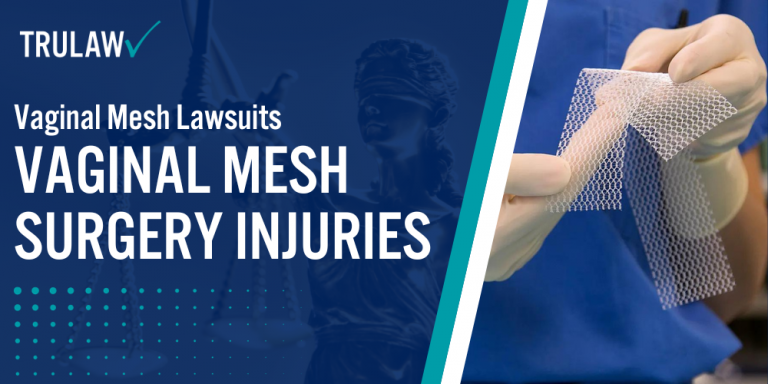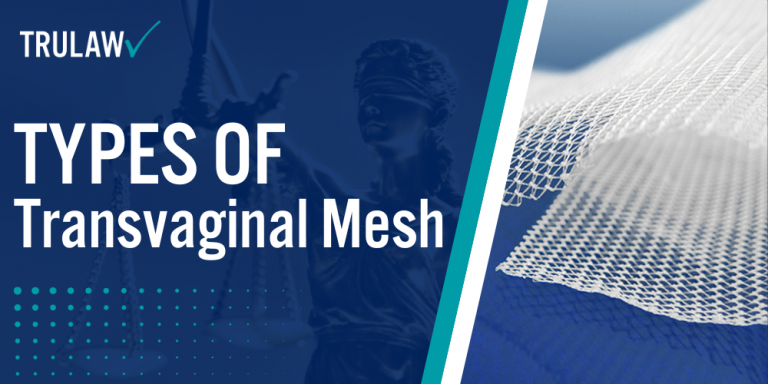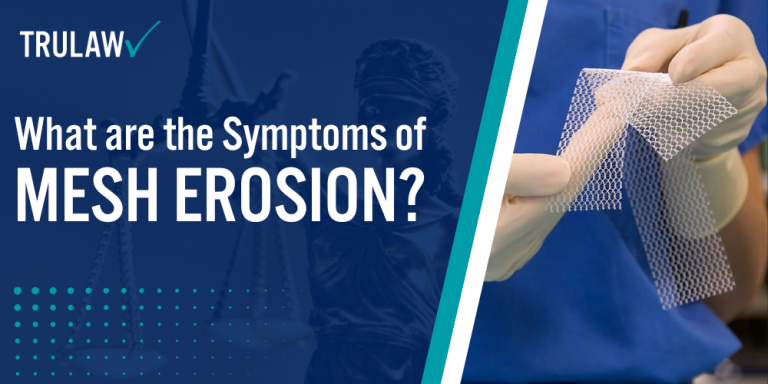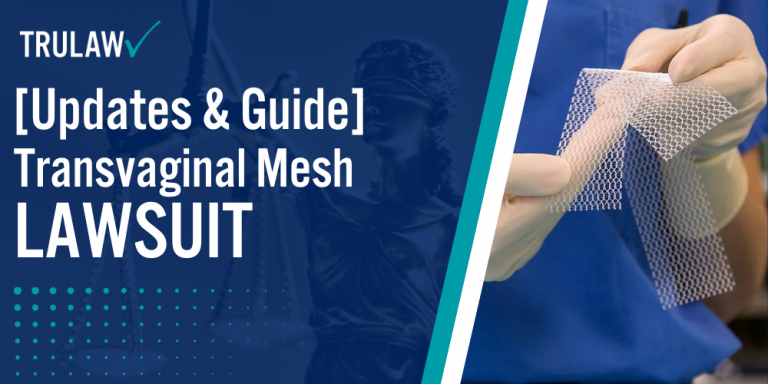Vaginal Mesh Lawsuits: Vaginal Mesh Surgery Injuries
- Last Updated: October 17th, 2024

Attorney Jessie Paluch, founder of TruLaw, has over 25 years of experience as a personal injury and mass tort attorney, and previously worked as an international tax attorney at Deloitte. Jessie collaborates with attorneys nationwide — enabling her to share reliable, up-to-date legal information with our readers.
Legally Reviewed
This article has been written and reviewed for legal accuracy and clarity by the team of writers and legal experts at TruLaw and is as accurate as possible. This content should not be taken as legal advice from an attorney. If you would like to learn more about our owner and experienced injury lawyer, Jessie Paluch, you can do so here.
Fact-Checked
TruLaw does everything possible to make sure the information in this article is up to date and accurate. If you need specific legal advice about your case, contact us by using the chat on the bottom of this page. This article should not be taken as advice from an attorney.
Key takeaways:
- The FDA has issued multiple warnings on the risks of vaginal mesh implants over the years.
- Manufacturers of vaginal meshes face serious accusations such as negligence, failure to warn about potential danger and defective design.
- Increased public awareness contributes to more scrutiny regarding the safety and effectiveness of surgical meshes in treating pelvic disorders.
Overview of Vaginal Mesh Surgery
On this page, we’ll discuss common Vaginal Mesh surgery injuries, accusations made against Vaginal Mesh manufacturers, average Vaginal Mesh Lawsuit settlements and payout amounts, and much more.
Intro to Vaginal Mesh Surgery Complications & Injuries
Vaginal mesh lawsuits primarily involve claims against manufacturers of transvaginal mesh implants, which have allegedly caused complications and injuries such as pain, bleeding, and organ perforation.
Notable cases and settlements include a $830 million settlement for 20,000 cases and a case where a New Jersey jury found in favor of Johnson & Johnson.

Here are some key points to understand about vaginal mesh lawsuits and the injuries associated with vaginal mesh surgery:
- Thousands of women have filed lawsuits due to injuries from vaginal mesh surgeries.
- These lawsuits have resulted in significant settlements, sometimes in millions of dollars.
- The complications and injuries associated with transvaginal mesh implants are severe, including pain, bleeding, and organ perforation.
If you’ve experienced vaginal mesh complications, injuries, or adverse effects from a transvaginal mesh implant- you may be eligible to file for the Transvaginal Mesh Lawsuit.
Contact the experienced Transvaginal Mesh Lawyers at TruLaw today for a no-obligation consultation.
We’re here to help you seek the compensation you deserve.
Table of Contents
Understanding Vaginal Mesh Surgery Injuries
Transvaginal mesh implants have been a subject of ongoing debate due to the significant risks they pose in the surgical management of pelvic floor disorders.
Risks of Vaginal Mesh Surgery
Vaginal mesh surgery carries a range of risks that can lead to severe complications.
It is crucial for women who have undergone this procedure to be aware of these risks, which include but are not limited to:
- Mesh Erosion
- Organ Perforation
- Chronic Pain
- Mesh Shrinkage
- Additional serious complications
Mesh Erosion
Mesh erosion is a significant concern in vaginal mesh surgery.
The surgical mesh can erode through the incision site into the vaginal canal, leading to internal tissue damage and vaginal scarring.
Treatment Options:
- Observation and physical therapy
- Medications
- Additional surgeries
Legal actions against mesh product manufacturers are on the rise due to the severe health risks associated with mesh erosion.
Organ Perforation
Organ perforation is another severe complication that can arise from vaginal mesh surgery.
The mesh may puncture or tear internal organs like the bladder or bowel, requiring further surgeries and extended recovery periods.
Victims have filed lawsuits against manufacturers, claiming inadequate disclosure of risks like organ perforation.
Chronic Pain
Chronic pain affects up to 30% of women who have undergone vaginal mesh surgery.
This persistent discomfort can severely disrupt daily activities and emotional well-being.
Mesh Shrinkage
Mesh shrinkage is another problematic complication.
The mesh contracts during the body’s natural healing process, pulling on surrounding tissues and causing chronic pelvic pain or painful sexual intercourse.
FDA Warnings and Public Awareness
The FDA has issued several warnings about the risks of vaginal mesh, leading to heightened awareness and concern amongst the public.
In the following segments, we provide an overview of the timeline of these actions and understand how they’ve shaped current attitudes towards this controversial treatment.
Timeline of FDA Actions
The Federal Food and Drug Administration (FDA) has taken important steps in addressing the risks associated with vaginal mesh.
The actions include, but are not limited to:
- 2008: FDA first identified complications linked to transvaginal mesh.
- 2011: The FDA released an update stating that serious complications are not rare, contradicting their earlier findings.
- 2013: The agency proposed reclassification of surgical mesh for transvaginal repair of pelvic organ prolapse from class II to class III, indicating higher risk.
- 2014: The FDA convened an advisory committee meeting to discuss the benefits and risks of surgical mesh as a treatment for pelvic organ prolapse and stress urinary incontinence.
- 2016: A breakthrough came when the FDA officially classified transvaginal mesh as a high-risk device.
- 2019: Three years later, in April, all manufacturers were ordered to stop selling and distributing surgical mesh for pelvic organ prolapse repair due to inadequate safety data.
Increased Public Awareness
Public awareness about the complications and risks of vaginal mesh surgery has seen a significant increase.
This rise in consciousness is largely due to the FDA’s efforts, through their safety communications and public health notifications, to safeguard women’s health.
The controversy surrounding vaginal mesh surgery has not only become a topic of discussion but also an issue of concern.
Allegations Against Vaginal Mesh Manufacturers
Numerous vaginal mesh manufacturers are currently under legal scrutiny for alleged negligence, failure to adequately warn about potential complications, and defects in both design and manufacturing.
The allegations against vaginal mesh manufacturers primarily focus on:
- Negligence
- Failure to Warn
- Defective Design and Manufacturing
Women who underwent procedures involving vaginal mesh implants were not sufficiently informed about potential risks, such as extreme discomfort, organ perforation, and chronic pain.
This lack of information has led to significant health issues for countless women.
Negligence and Failure to Warn
Several manufacturers, including Johnson & Johnson, are facing over 700 class-action lawsuits from women who claim they were harmed due to faulty pelvic mesh implants.
These lawsuits allege that the companies failed to provide adequate warnings about the potential complications post-implantation.
Between 2013 and 2015 alone, multiple cases emerged that accused:
- Inadequate risk assessment
- Insufficient information about potential complications
The importance of accurate risk assessment information in the medical device industry cannot be overstated, given the severe consequences of neglecting this responsibility.
Defective Design and Manufacturing
Manufacturers like Johnson & Johnson and Boston Scientific Corp. are also accused of releasing inadequately tested products.
Both companies have reached substantial settlements in lawsuits related to:
- Neglectful practices
- Faulty product creation
These settlements underscore a significant disregard for patient safety in the production processes, reinforcing the allegations of defective designs and manufacturing flaws within this sector of the medical device industry.
Current Litigation and Status of Vaginal Mesh Lawsuits
The legal landscape surrounding vaginal mesh implants is continuously evolving, with significant developments in Multidistrict Litigations (MDLs), bellwether trials, and settlements.
Understanding these elements is crucial for those affected by complications from vaginal mesh implants, and has far-reaching implications for future cases
Multidistrict Litigation (MDL) and Bellwether Trials
MDL is a judicial process that centralizes multiple lawsuits of a similar nature to be handled collectively by one court.
Although the primary MDL related to transvaginal mesh lawsuits has closed, it played a pivotal role in resolving numerous cases efficiently.
Bellwether trials, which are initial test cases, have also been instrumental in:
- Identifying trends and patterns in legal arguments
- Indicating potential outcomes for future similar cases
These procedures have expedited the litigation process for many individuals, ensuring justice for victims while maintaining a fair trial for all parties involved.
Settlements and Ongoing Litigation
Major manufacturers have already paid billions in settlements to women suffering from complications due to vaginal mesh implants.
Ethicon, a leading producer, is currently challenging a $302 million judgment from the state of California but remains involved in an ongoing lawsuit overseen by the U.S. Supreme Court as of 2023.
Approximately 95% of these cases have been resolved through MDLs, leading to:
- One of the largest mass tort litigations in history
- Roughly $8 billion in settlements for plaintiffs
Despite these settlements, litigation is still ongoing.
New cases continue to emerge, highlighting the ongoing issues related to vaginal mesh implants.
If you’ve experienced vaginal mesh complications, injuries, or adverse effects from a transvaginal mesh implant- contact TruLaw today for a no-obligation consultation.
We’re here to help you seek the compensation you deserve.
Filing a Vaginal Mesh Lawsuit
For those affected by complications arising from vaginal mesh implants, understanding the legal process is crucial.
This guide outlines how to determine if you have a valid case, the statute of limitations, and the steps involved in pursuing litigation.
How to Determine if You Have a Case
Determining the validity of your case involves several critical factors.
Medical records demonstrating complications or injuries after vaginal mesh surgery are essential.
These complications may include chronic pain, infections, or organ perforation.
Additionally, evidence of negligence can bolster your case:
- Failure of the healthcare professional in their duty of care
- Manufacturer’s failure to adequately warn patients about potential risks
Concrete instances of such negligence significantly strengthen the grounds for a lawsuit.
Statute of Limitations
The statute of limitations varies by state, generally ranging from three to ten years.
Importantly, the countdown begins when you become aware of your injuries, not necessarily the date of the surgery.
Specific circumstances may extend these limitations, making it crucial to be mindful of these deadlines to preserve your legal rights effectively.
Steps in Filing a Lawsuit
- Consult a Specialized Law Firm: The first step is to consult with a specialized law firm to determine if you have a valid case.
- Collect Medical Records: These documents are vital in supporting your claim by demonstrating the negative health effects of the vaginal mesh implant.
- Identify the Mesh Device: Knowing the specific device used in your surgery helps target the correct manufacturer in your lawsuit.
- Statute of Limitations: Ensure you file within the time frame dictated by your state’s personal injury laws, typically 2-3 years from when you became aware of the injury.
- Draft and Submit a Legal Complaint: This complaint outlines allegations against the manufacturer, such as design defects, negligence, or warranty breaches.
- Discovery Phase: Both sides gather information post-submission. You may need to answer written questions or provide oral testimony.
- Settlement or Trial: Depending on the strength of your case and other factors, manufacturers may propose settlements. To date, transvaginal mesh makers have settled claims amounting to over $8 billion.
Potential Settlement Amounts of Vaginal Mesh Lawsuits
The settlement amounts in vaginal mesh lawsuits can vary significantly, influenced by a range of factors including the severity of injuries, medical costs, and personal suffering.
Understanding these variables is crucial for those considering legal action.
Vaginal Mesh Lawsuits
Vaginal mesh cases have been part of one of the largest mass tort litigations in history.
Significant payouts have been awarded; for example, a New Jersey jury granted a substantial sum for severe vaginal scarring and ongoing pubic bone pain due to synthetic mesh exposure.
It’s crucial to consult legal counsel promptly, as statute limitations may impact your ability to file a claim.
Estimated Settlement Values
Settlement values can differ greatly based on the extent and severity of injuries. Lawyers representing plaintiffs have suggested total settlement sums as high as $11 billion.
Specific cases, like a recent New Jersey award of over $7 million, provide a basis for these estimates.
Previous verdicts also offer insights:
- In 2019, two separate Philadelphia juries awarded amounts of $120 million and $80 million to women with severe complications from vaginal mesh surgery.
- For 2023, estimated payouts for successful lawsuits could range from approximately $150,000 to well over $400,000.
These substantial sums underscore the severe impact of injuries from vaginal mesh implants.
Factors Influencing Settlement Amounts
Several factors can affect the settlement amount in vaginal mesh lawsuits:
- Severity of the Injury: More severe and life-altering injuries usually result in higher estimated settlement values.
- Extent of Medical Treatment: More invasive or lengthy medical procedures can lead to higher compensation.
- Recurrence of Complications: Repeated infections or additional surgeries due to mesh complications may increase your potential settlement.
- Impact on Quality of Life: Factors like chronic pain, inability to work, or loss of enjoyment in life can also influence your compensation.
- Age and Overall Health: Younger claimants in good health may receive larger settlements, as they have to live with the impact for a longer period.
- Legal Representation: The skill and experience of your attorney can significantly affect the amount you’re awarded.
If you’ve experienced vaginal mesh complications, injuries, or adverse effects from a transvaginal mesh implant- contact TruLaw today for a no-obligation consultation.
We’re here to help you seek the compensation you deserve.
Injuries Associated With Vaginal Mesh Surgery
These injuries associated with vaginal mesh surgery can vary in severity, from mild discomfort to severe complications requiring additional medical intervention.
Individuals undergoing vaginal mesh surgery may encounter the following injuries:
- Voiding Dysfunction
- Recurrent Urinary Tract Infections (UTIs)
- Fistulae
- Organ Perforation
- Neuromuscular Alterations
- Lower Urinary Tract Symptoms (LUTS)
- Bowel Complications
Voiding Dysfunction and Recurrent UTIs
Post-surgery, some women may face challenges related to urination, known as voiding dysfunction.
This condition can lead to an increased susceptibility to urinary tract infections (UTIs).
Frequent UTIs can further exacerbate voiding dysfunction, creating a cycle that may require ongoing medical treatment.
Fistulae and Organ Perforation
In rare but severe instances, the mesh material may erode to such an extent that it forms a fistula, an abnormal connection between two organs.
Additionally, the mesh can perforate an organ, causing internal bleeding and requiring immediate medical intervention.
Neuromuscular Alterations and LUTS
Changes in nerve and muscle function can manifest after vaginal mesh surgery.
These neuromuscular alterations can lead to lower urinary tract symptoms (LUTS), such as urinary incontinence or retention.
These symptoms can significantly impact the quality of life and may necessitate further treatment or surgical correction.
Bowel Complications and Immune Disorders
Though less common, bowel complications can arise from vaginal mesh surgery.
These complications can include bowel obstruction or perforation, leading to severe abdominal pain and potentially life-threatening conditions.
Additionally, some patients have reported immune disorders post-surgery, though the direct correlation between vaginal mesh and immune disorders is still under investigation.
It is crucial for patients to be fully informed of these potential risks before undergoing the procedure
Conclusion: Seeking Justice for Vaginal Mesh Surgery Injuries
Vaginal mesh injuries inflict severe harm and suffering on women.
Filing a vaginal mesh lawsuit can hold manufacturers accountable for these injuries.
Legal action also brings the chance of receiving rightful compensation for medical expenses, pain, and suffering.
Pursuing justice in this way amplifies awareness about the risks involved with vaginal mesh surgery and safeguards the health of women worldwide.
Frequently Asked Questions
-
What is a vaginal mesh implanted for?
Vaginal mesh implants serve as a supportive structure for prolapsed organs.
The mesh is inserted into the vaginal wall, aiding the body’s natural tissue in holding up the organs that have fallen due to various reasons such as childbirth, age, or strain.
With this surgical procedure:
- Tissue grows into the holes of the mesh, creating a supportive wall.
- The mesh implant provides extra support to repair weakened or damaged internal tissue.
- The purpose is to help hold up the prolapsed (fallen) organs.
-
What is a transvaginal prolapse repair?
Transvaginal prolapse repair, also known as colporrhaphy, is a surgical procedure used to treat prolapse of the anterior (front) and posterior (back) wall of the vagina.
The primary goal of the surgery is to reposition the prolapsed organs back to their original places.
The main components of transvaginal prolapse repair involve:
- Strengthening the vaginal walls: The weakened vaginal walls are reinforced using stitches to once again support the bladder or rectum.
- Additional procedures if needed: In some cases, a bladder suspension, vaginal hysterectomy, and rectocele repair may be performed at the same time through a vaginal incision.
- Use of a mesh: Depending on the severity of the prolapse, a customized mesh may be inserted to further support the prolapsed organs.
-
Are there complications with the use of surgical mesh?
Many patients have experienced serious complications after the mesh is implanted.
These complications include, but are not limited to:
- Bleeding
- Pain
- Inability to have sex
- Organ perforation
One of the most common complications is mesh erosion, whereby the sharp edges of the mesh cut into vaginal tissues and organs.
-
Who are the manufactures of Transvaginal Mesh?
These companies produce many different transvaginal mesh products through different subsidiaries and profit substantially from the market for these devices.
However, many women suffer debilitating problems due to these implants.
The main manufacturers of the transvaginal mesh include:
- Johnson & Johnson
- Boston Scientific
- Bard Medical
- American Medical Solutions
- Coloplast

Experienced Attorney & Legal SaaS CEO
With over 25 years of legal experience, Jessie is an Illinois lawyer, a CPA, and a mother of three. She spent the first decade of her career working as an international tax attorney at Deloitte.
In 2009, Jessie co-founded her own law firm with her husband – which has scaled to over 30 employees since its conception.
In 2016, Jessie founded TruLaw, which allows her to collaborate with attorneys and legal experts across the United States on a daily basis. This hypervaluable network of experts is what enables her to share reliable legal information with her readers!
You can learn more about the Transvaginal Mesh Lawsuit by visiting any of our pages listed below:
Here, at TruLaw, we’re committed to helping victims get the justice they deserve.
Alongside our partner law firms, we have successfully collected over $3 Billion in verdicts and settlements on behalf of injured individuals.
Would you like our help?
At TruLaw, we fiercely combat corporations that endanger individuals’ well-being. If you’ve suffered injuries and believe these well-funded entities should be held accountable, we’re here for you.
With TruLaw, you gain access to successful and seasoned lawyers who maximize your chances of success. Our lawyers invest in you—they do not receive a dime until your lawsuit reaches a successful resolution!
Do you believe you’re entitled to compensation?
Use our Instant Case Evaluator to find out in as little as 60 seconds!
AFFF Lawsuit claims are being filed against manufacturers of aqueous film-forming foam (AFFF), commonly used in firefighting.
Claims allege that companies such as 3M, DuPont, and Tyco Fire Products failed to adequately warn users about the potential dangers of AFFF exposure — including increased risks of various cancers and diseases.
Suboxone Tooth Decay Lawsuit claims are being filed against Indivior, the manufacturer of Suboxone, a medication used to treat opioid addiction.
Claims allege that Indivior failed to adequately warn users about the potential dangers of severe tooth decay and dental injuries associated with Suboxone’s sublingual film version.
Social Media Harm Lawsuits are being filed against social media companies for allegedly causing mental health issues in children and teens.
Claims allege that companies like Meta, Google, ByteDance, and Snap designed addictive platforms that led to anxiety, depression, and other mental health issues without adequately warning users or parents.
Transvaginal Mesh Lawsuits are being filed against manufacturers of transvaginal mesh products used to treat pelvic organ prolapse (POP) and stress urinary incontinence (SUI).
Claims allege that companies like Ethicon, C.R. Bard, and Boston Scientific failed to adequately warn about potential dangers — including erosion, pain, and infection.
Bair Hugger Warming Blanket Lawsuits involve claims against 3M — alleging their surgical warming blankets caused severe infections and complications (particularly in hip and knee replacement surgeries).
Plaintiffs claim 3M failed to warn about potential risks — despite knowing about increased risk of deep joint infections since 2011.
Baby Formula NEC Lawsuit claims are being filed against manufacturers of cow’s milk-based baby formula products.
Claims allege that companies like Abbott Laboratories (Similac) and Mead Johnson & Company (Enfamil) failed to warn about the increased risk of necrotizing enterocolitis (NEC) in premature infants.
Here, at TruLaw, we’re committed to helping victims get the justice they deserve.
Alongside our partner law firms, we have successfully collected over $3 Billion in verdicts and settlements on behalf of injured individuals.
Would you like our help?


